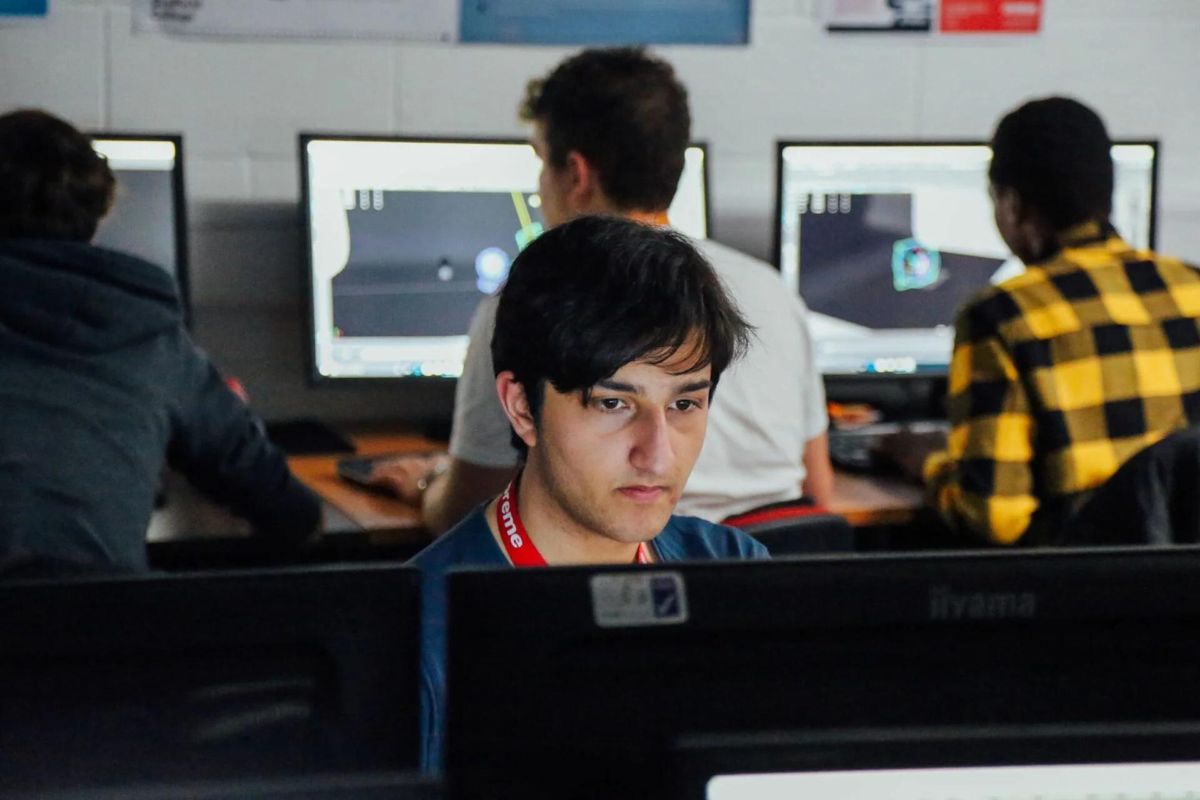Government should consider new health and employment rights to protect wellbeing in the digital world

#LifeBeyondCOVID Beyond Digital: Planning for a Hybrid World – @HLCOVID19Com
The Select Committee on COVID-19 publishes its report Beyond Digital: Planning for a Hybrid World and warns that more needs to be done to ensure that we all benefit from our increasing reliance on digital technology post-pandemic and that it does not lead to increasing inequality and marginalisation.
For many people, it is hard to imagine what the last year would have been like without the internet: it became a lifeline that enabled people to stay in touch with friends and family, for shops to continue to trade, for many to continue to work, and for everything from GP appointments, to education, to debates in the House of Lords, to take place without the infection risk from meeting with others.
However, as 11% of households (equating to 2.8 million households) do not have internet access, 9 million people are unable to access the internet by themselves, 11.7 million people lack the digital skills for everyday life and almost half of ‘non-users’ have a disability or long-standing health issue -there is a real risk that any increasing reliance on digital technology will exacerbate existing inequalities.
The Chair of the Committee, Baroness Lane-Fox of Soho said:
“The future was always going to be hybrid – an increasingly blurred mix of online and offline aspects of life. Due to the pandemic, that future is here now and as a result the need for Government action is greater than ever to ensure a hybrid future fit for and beneficial to all.
“The Government’s current digital strategy is unfit for purpose to operate in our new hybrid post-pandemic society and it must adopt a new, truly hybrid strategy. The development of this new strategy must be led centrally from the Cabinet Office, alongside the recognition that this issue goes beyond being considered from a purely ‘digital’ perspective and must be more fundamental than is currently being envisaged.”
Key recommendations
The Committee’s report sets out a range of recommendations to maximise the opportunities, and mitigate the risks, of the hybrid world.
- While the UK Government has announced its intention to develop a new Digital Strategy, the Committee believes that it should go further, and develop a new Hybrid Strategy, which recognises that all aspects of our lives are, and will increasingly be, a hybrid blend of online and offline interactions. As with other critical issues that affect all Government departments, responsibility for a new hybrid strategy should sit with the Cabinet Office and the Prime Minister.
- The Government should consider introducing a legal right to internet access and digital infrastructure, but to tackle the immediate lack of digital access the Government should work with internet providers to develop a scheme to provide affordable internet access to those in poverty and on low incomes.
- As part of its new hybrid strategy, the Government should develop a genuinely hybrid healthcare service, underpinned by a code of practice giving patients the right to receive services online or offline and guaranteeing a minimum service standard for both offline and online healthcare services. In developing the code of practice, the Government should undertake a review of patients’ rights in hybrid healthcare provision, including its impact on accessibility, privacy and the triage between face-to-face and digital provision.
- Alongside its new hybrid strategy, the Government should consult on strengthening the current legislative framework for employment rights, to ensure it is suitable for the digital age, as well as introducing new legislation to provide platform works with enhanced employment rights.
Beyond Digital: Planning for a Hybrid World
When this Committee was established in May 2020, very few people imagined that, a year later, our lives would still be severely restricted by the pandemic.
People’s work, education, relationships, social and leisure activities and opportunities to travel have all been curtailed.
The fact that we have been able to continue with these things to the extent that we have has in large part been thanks to the internet. Indeed, the way that the internet enabled many people to continue to work, learn, trade, access services etc is what made it possible for governments to introduce the restrictions that they did; the internet enabled many of us to stay home, and to stay safe.
This dependence on the internet as a result of the pandemic has led to a massive acceleration in many pre-existing digital trends: from online shopping to online GP appointments, automation of jobs to remote working. It has been a catalyst for breaking through the inertia that existed in some sectors in relation to digitalisation and we have adjusted our behaviours and invested in technology to the extent that we have reached a level of digitalisation that we might not otherwise have done for many years.
This last year of living online has highlighted starkly the huge inequalities that exist in this country. The children who have lost a year of schooling for want of a laptop and an internet connection; the businesses that could not move their trade online because they lacked the skills or broadband access to do so; those who have spent the year isolated and alone, not able to join an online community group or religious service because they have never used the internet and would not know where to start. We should, as a society, be ashamed that so many have suffered unnecessarily, for want of the things that have become such basic essentials of modern life.
The future was always going to be hybrid—an increasingly blurred mix of online and offline aspects of life. As a result of the pandemic, that future is here now. Some individuals, organisations and businesses will adapt pretty effortlessly but many millions will not. This is a societal change that affects us all, whether we want it to or not, and we believe Government intervention needs to be more fundamental than is currently being envisaged.
For this inquiry, we set out to look at the impact that the pandemic-driven digital acceleration might have in the long-term on the aspects of life known to have the biggest impact on our wellbeing: physical and mental health, social connection, education, quality of work. In each area, we found that there had been real (and sometime surprising) benefits to some people from the sudden shift to digital; benefits that must not be lost in a desire to ‘return to normal.’
We also heard plenty of examples of where digital was a very poor substitute for ‘in person’ services and interactions. This year has left many of us longing for, and appreciating, the value of human contact as never before.
Most damningly, we heard time and again that the most disadvantaged and marginalised people in society were being further marginalised and disadvantaged because they did not have the money to pay for an internet connection and a computer, did not have the appropriate space at home, or did not have the skills and confidence to fully participate in the online world.
Without urgent Government action we risk:
- Services being digitalised, sometime badly, for cost-saving reasons, without understanding the impact on those who use them;
- People feeling (and being) constantly, electronically, monitored at work, working longer and longer hours, unable to switch off or maintain a separation between work and home;
- Thousands, maybe millions, of jobs being lost to automation with no plan in place to provide the skills and training needed for those affected to move into the new jobs that will be created; and
- A variety of digital trends and local government funding constraints combining to reduce our opportunities to meet with others.
From automated check-out tills, to pub and library closures, homeworking and digital personal trainers, there is a legitimate fear that the digitalisation driven by one pandemic could result in another: a pandemic of loneliness.
The UK Government has already committed to producing a new digital strategy in light of the economic and societal changes of the last year. However, if this is simply an updated version of what has gone before this will be nothing like sufficient.
The gulf between the digital ‘haves’ and ‘have nots’ will become a new dividing line, with society separated between those for whom digitalisation means a move to a rural idyll, the flexibility of home working, and easy access to online services; and those for whom it means precarious, poorly paid work, with access to public services and amenities restricted to whatever stripped down ‘in person’ offering remains and living in cramped homes that make it difficult or impossible to prosper in the new hybrid era.
As with other major cross-cutting issues—Brexit, devolution, Government efficiency—responsibility for the Government’s strategic response should sit with the Cabinet Office because this shift will affect the development of public policy across all of Whitehall. ‘Digital’ has far outgrown the time when it could sit siloed as a separate policy area in a single government department. Investment in digital infrastructure and skills is very much needed.
However, that on its own will not be enough. This strategy needs to be genuinely new and to take into account fully the profound changes of the last year. We need a new ‘social contract’ in light of how digitalisation is shaping society: what can individuals now expect from the state, from services and from employers, and what can those organisations expect from us? How we, collectively, answer this question will be a critical factor in the long-term impact of this last year on our individual and collective wellbeing.
The environment and climate change in a hybrid world Although commuting to work (and travel of all sorts) significantly reduced during the pandemic, with a consequent reduction in emissions, other COVID-related behaviour change may have had a negative environmental impact.
There has been a significant increase in vehicles delivering online shopping and takeaway meals to people’s homes, for example, while working from home will have changed patterns of energy consumption. The Government should make a careful assessment of the climate change implications of the hybrid world and adopt policies to mitigate any negative impact.
The House of Lords COVID-19 Committee
Digital equality needed to ease job hunting for UK’s unemployed

Responding to House of Lords’ recent report, Beyond Digital: Planning for a Hybrid World, report respondent and digital training provider We Are Digital is calling for digital equality to ease the job hunting process for the UK’S unemployed.
“The workplace’s points of entry are becoming increasingly digitised, and finding a job offline has proved impossible for many over the course of the pandemic,” said Matt Adam, chief executive, We Are Digital.
“The pandemic has of course highlighted the digital inequalities present in our society, in a world in which 11% of households don’t have access to the internet (Ofcom). It’s vital to get these more marginalised groups out of digital poverty to improve their employment prospects. Data packages tailored specifically to these groups are a vital first step out of digital poverty.”
The report called for the government to ensure that using digital technology to tackle existing inequalities is a key strand running through its updated Digital Strategy (due to be published later this year).
“We have found that more and more companies and sectors are requiring digital skills, including higher-level skills in areas such as digital marketing,” Adam continued.
“As one of the providers of the government’s new Digital Bootcamp schemes, we have learned that all over the UK, employers are crying out for digital talent. As the shift away from the high street and the online growth explosion continues, this will only continue to grow, and upskilling will play a large role in this. Our digital skills employability courses for young, excluded people in Manchester have, for example, operated highly successfully online, even in large groups, and gone on to create new job opportunities for participants, showing just what is possible online, even in a pandemic. The opportunities are out there, provided we can help our more marginalised groups to access them.”












Responses